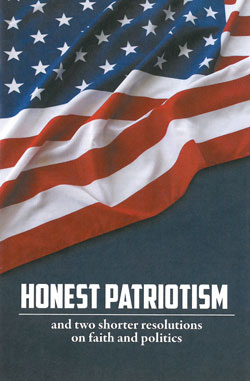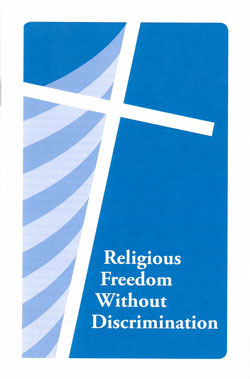Both guides are available for free download
By Christian Iosso | Special to Presbyterian News Service
LOUISVILLE — The Advisory Committee on Social Witness Policy (ACSWP), which serves the Church by providing the General Assembly with careful studies on issues with moral challenges, Christian discernment, and making policy recommendations for faithful action, announced the publication of two new General Assembly resources. Honest Patriotism is a theological and ethical guide on civic responsibility. Religious Freedom Without Discrimination describes claims of religious freedom being used to exempt individuals and employers from providing women’s reproductive health coverage or goods and services to LGBTQ+ individuals.
Honest Patriotism and Religious Freedom Without Discrimination are available for free download. Both publications supplement Lift Every Voice, the church’s key report on voting rights and electoral reform. The most basic message of these resources is that voting is a right to be exercised and not blocked by partisan officials in states and localities.
 Honest Patriotism
Honest Patriotism
Honest Patriotism was described in July as “an intentionally short and theologically strong statement that addresses the unnecessarily conflictual politics of today.” It focuses on the need for truth and the role of the free press (and other institutions) in protecting First Amendment rights for all. It shows how the Reformed tradition still grounds democratic values and ethos. It calls for measures of public accountability for truthfulness in the public square in all its forms: over public airwaves, through cyberspace, and through required public disclosure by government agencies, for-profit and nonprofit entities. Except for hate speech, freedom of speech is to be unrestricted, with the widest possible access to information, protection of whistle-blowers, publication of research, and public assembly rights. Respect for privacy of personal information from government or private surveillance and commercialization is affirmed.
The phrase “honest patriotism” comes from a 2005 book by Presbyterian ethicist Donald W. Shriver Jr. and means “loving a country enough to remember its misdeeds.” The goal is not only to remember, but with repentance and other Biblical practices, to work toward restorative and reparative justice. Honest Patriotism is printed with two short resolutions that originated in Hudson River Presbytery — “A Declaration Against Autocracy” and “A Resolution Against Racist Nationalism.” These were seen as illustrations of similar concerns and supported by positively framed General Assembly policies, such as the Social Creed for the 21st Century.
 Religious Freedom Without Discrimination
Religious Freedom Without Discrimination
Religious Freedom Without Discrimination and the shorter related resolution, The Boundaries of Religious Liberty, draw on the Historic Principles of Church Order (1788) to affirm that religious freedom should be “equal and common to all.” They build on the thorough policy statement, God Alone is Lord of the Conscience (1988), to provide contemporary Reformed interpretation of the religion clauses of the First Amendment that is both practical and theological. Both resolutions include examples of legal cases and decisions that illustrate the issues at stake.
The bottom line is that religious liberty is not to be claimed to justify “discrimination in the provision of secular employment or benefits, health care, public or commercial services or goods, or parental rights to persons based on race, ethnicity, sex, gender, physical limitations, sexual orientation, gender identity, religion or gender expression.” These benefits would include the full range of reproductive health services. Attention is given to international contexts liable to different forms of government intervention, where the church/state boundaries are drawn in different ways.
Both booklets end with paragraphs summarizing the advisory role that General Assembly social witness policy plays for members, congregations and mid councils. The recommendations in the policy booklets are binding on the agencies of the General Assembly, ensuring (for example) that the Office of Public Witness in Washington, D.C., and the Presbyterian Ministry at the United Nations advocate what the Assembly has agreed upon. Recommendations addressed to other councils of the Church are meant to encourage, educate and invite dialogue.
Christian Iosso is coordinator of the Advisory Committee on Social Witness Policy for the Presbyterian Church (U.S.A.) and an ordained minister in the PC(USA). A former pastor, he also serves as senior editor of Unbound, an online journal of Christian social justice developed by ACSWP. The current issue explores civic engagement: “Make America Just. Period.” Its lead article looks at the biggest challenge to voting: “Apathy is the Most Powerful Force in American Politics.”
![]() You may freely reuse and distribute this article in its entirety for non-commercial purposes in any medium. Please include author attribution, photography credits, and a link to the original article. This work is licensed under a Creative Commons Attribution-NonCommercial-NoDeratives 4.0 International License.
You may freely reuse and distribute this article in its entirety for non-commercial purposes in any medium. Please include author attribution, photography credits, and a link to the original article. This work is licensed under a Creative Commons Attribution-NonCommercial-NoDeratives 4.0 International License.
Categories: Advocacy & Social Justice
Tags: a social creed for the 21st century, acswp, advisory committee on social witness policy, elections, electoral reform, honest patriotism, lgbt, lgbtq, religious freedom, voting rights
Ministries: Advisory Committee on Social Witness Policy (ACSWP), Compassion, Peace and Justice